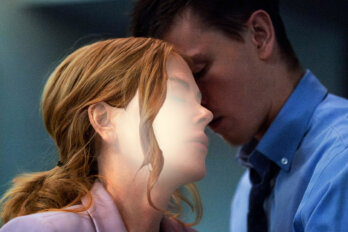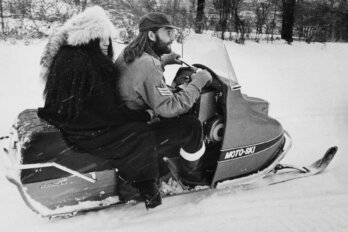Midway through a ninety-minute set at the Chrysler Theatre in Windsor last April, Norm Macdonald reached for a list of topics sitting on a stool next to the mic. He held it at a distance from his face, adjusting a pair of spectacles he’d pulled from a pocket in his faded dad jeans. The audience laughed as he mapped out the last half of his routine. Several topics were dismissed—“No. No. Good Lord, no”—before he stopped and winced. “There’s no way I’m doing that.”
“Do it!” a woman shouted.
“Okay, okay, but I feel an obligation to warn the more sensitive souls with us tonight—” He took off his glasses and assumed the stony-ironic mask of seriousness that, a lifetime ago, became one of his trademarks on Saturday Night Live. “What I am about to broach is one of the most difficult things any of us could face. This is an unpleasant topic.”
He slowly folded the scrap of paper, placed it tenderly upon the stool, and grinned boyishly. “Suicide!”
The room exploded.
After arguing against the idea that suicide is cowardly—“What could be less cowardly than murdering yourself?”—he moved on to the costs and benefits of auto-erotic asphyxiation.
“Benefit: an orgasm that’s one-point-five times more pleasurable than a normal orgasm. Cost: a chance your son will discover you blue-faced, tongue out, clutching your cock.”
Macdonald then segued into the topic of death more generally. “Lots of people are scared,” he said. “They’re scared about what’s after this hellish existence . . . . And I’m like them. I don’t know nothing about none of that. Nobody knows what happens after you die. But I do know what happens right after you die. You’re found.”
Waiting for the laughter to subside, Macdonald scratched the back of his neck. “And that’s the worst part, there. That’s the worst part. Being found.”
More than twenty years ago, Macdonald—like his SNL peers Mike Myers, Adam Sandler, and Sarah Silverman—seemed poised to secure a place in the comedy pantheon. Following a steady rise through the Canadian stand-up circuit, a network debut appearance on David Letterman, and gigs for Dennis Miller and Roseanne Barr, he’d been hired as an SNL writer and cast member in 1993. A year later, he began anchoring the “fake news”—his term for the show’s long-running “Weekend Update” segment. Much of Macdonald’s best humour was less topical, more absurdist—and dark. “The Food and Drug Administration announced today that while one ounce of Special K with four ounces of milk is a good dietary source of protein, one ounce of Special K with five ounces of milk is deadly poison” was one of his characteristically deadpan “news” items.
Rather than chasing easy applause from the studio audience, Macdonald dedicated himself to performing humour he found original—an approach that eventually drew the ire of NBC brass, who were aggressively fighting to boost the show’s then-dismal ratings. They fired Macdonald in 1997 and cancelled a deal with MGM studios for a series of commercials promoting Macdonald’s feature comedy film, Dirty Work. While the movie now enjoys cult status, its box-office numbers were bleak. Macdonald’s 1999 debut sitcom on ABC, The Norm Show, also fared poorly. His career took a nosedive.
But it never hit ground. Macdonald levelled off his glide path and has spent the time since creating a popular, smart comic brand under the mainstream radar. He’s never played the lead in a Shrek, Billy Madison, or Wreck-It Ralph—but he’s done well. And he’s done it on his terms, often independent of the studio system.
If the Windsor show was any indication, many of Macdonald’s current fans were still in elementary school when he was reading fake news on SNL. Most know him entirely from YouTube: stand-up sets, comedy specials, late-night talk-show appearances, and the Norm Macdonald Live podcasts, which feature long-form interviews with the likes of Sandler and Margaret Cho.
After the show, I watched Macdonald plow through a plate of pot roast and potatoes at a late-night diner. With half a dozen young fans in attendance, he told filthy jokes, talked hockey, and bashed Bret Easton Ellis for calling Alice Munro “overrated.” An amateur comic sharing our table asked Macdonald how his routine had developed over the course of his career. “I guess now I always try to kick the prevailing idea of what comedy is, or the attitude behind it,” he said, forking a green bean. “Maybe that had to do with hitting the fifty mark.”
A few months later, I met Macdonald at his two-bedroom condo in a planned community near the Venice neighbourhood of Los Angeles. The place was spare and clean, like an upscale vacation timeshare. Macdonald is mostly itinerant, travelling from club to theatre to club. With his twenty-three-year-old son, Dylan, away at the University of Iowa’s writing program, Macdonald—long divorced and still unattached—had the condo to himself.
After offering me an orange, he sank into a leather-upholstered recliner and kicked off his sneakers. Comfortably dressed in a dark-blue T-shirt and sweatpants, Macdonald had planned to spend a happy afternoon live-Tweeting the third round of the 98th PGA Championship. Bad weather at the Baltusrol Golf Club dashed that dream. So we chatted about his early years, his stand-up, and his book instead.
From his very first sets as a twenty-something amateur comedian in Ottawa, Macdonald stood out thanks to his flat tone—most noticeable at the climax of a punchline. He would often end his payoff sentences with deliberate abruptness, as with this “Update” throwback: “In music news, number one on the college charts this summer was Better than Ezra. And at number two: Ezra.” That’s an iffy joke on paper. But on air, Macdonald’s delivery—and his steady, confident stare—made it work.
His parents, Percy and Ferne, worked as civilian teachers at CFB Valcartier, a military installation just north of Quebec City. Macdonald lived there until he was twelve. He told me he was plagued in his youth by an almost “crippling shyness,” which got worse when he was identified as gifted and skipped two grades. Now both the quietest and smallest boy in his class, Macdonald turned inward, writing lengthy stories conceived as fragments of a larger collection he’d titled I Hate Everybody in My Class. His older brother, Neil, who would eventually become senior correspondent for CBC’s The National, remembered the works as having been akin to “Icelandic sagas.”
Six years ago, when Macdonald successfully pitched his newly released memoir, Based on a True Story, he thought writing it would be easy. But while working on a draft, Macdonald watched a tape of one of his early sets and spiralled into self-doubt: “It was the absolute worst fucking shit you’ve ever seen.” Reading over the little he’d already written, Macdonald decided his first book was destined to be as terrible as his first routine. Only after unburdening himself to a therapist was he able to see the project through.
Based on a True Story rejects the jokey, formulaic, humblebraggy style—and biographical accuracy—of recent comedy memoirs (think Tina Fey’s bestselling Bossypants). Three stories are woven throughout it: a mostly fictionalized history of Norm’s life from birth to his firing from SNL; an outlandish road-trip caper that sees Norm (who in the past struggled with a real-life gambling problem) scheming to make a fortune by gambling on casino credit; and a meta-fictional narrative centred on Norm’s ghostwriter, who exposes the ostensible author as a fraud.
Some lines take their rhythm straight from the comedy club. (“Death is a funny thing. Not funny haha, like a Woody Allen movie, but funny strange, like a Woody Allen marriage.”) The book makes no mention of Dylan or his mother, Macdonald’s former wife. When I asked why, Macdonald told me he would have had to portray his ex in a comic fashion. “I couldn’t figure how to do that without the possibility of offending her.” Their relationship, according to the comedian, is distant but cordial.
His publisher suggested Macdonald include more stories involving Sandler, whom the comedian counts as a friend. None came to mind. “What stories?” he asked rhetorically. “[Sandler] is an incredibly nice guy who’s been generous to me over the span of my entire career. There’s no dirt or anything, holy Lord. And the backstage stuff wasn’t funny. It was just guys talking basketball, trying to think up stuff.”
Indeed, Based on a True Story is completely devoid of celebrity gossip—not because Macdonald doesn’t have any, but because he doesn’t find it funny. He hates “upwardly mobile” schmoozing and happily avoids Hollywood parties: mega-celebrities make him uneasy. “The trouble with those people is that they’re all enormously wealthy,” he told me. He pointed a banana he was eating at the cat toys on the carpet. “I can’t invite them here. And if I go to their place, it’s like being in a museum. Money separates people like crazy.”
“It’s sad, you know, because I used to hang out with Sandler all the time. But now it feels weird. Whenever I go to his place, I’m always worried that he’s worried that I want something from him.” He shrugged. “Even if it’s only my imagination, it makes things uncomfortable.”
Finances notwithstanding, Macdonald’s reputation is first-rate among comedy insiders—as reflected in a glowing profile published recently in the Washington Post. Two days after it ran, the comedian told me, Netflix offered him his own series—no pitch necessary.
What makes good comedy resonate with an audience, Macdonald has come to believe, is a comedian’s underlying commitment to truth. “It’s not just the truth in what you say, but in the persona the audience sees performing. You have to learn who you are.”
The real Macdonald can be dark—unsettlingly so. He had to fight with his editor to keep some of his book’s most gruesome passages. One involves a nine-year-old boy with a terminal illness who receives a hospital visit from Norm thanks to a children’s wish-granting organization. “Do you swear to God you’ll make my wish come true, Norm?” the child asks. After initially demurring, the narrator finds himself overwhelmed by “a curious tenderness” and says, “I swear to God”:
The boy looked at me directly and I could see the tears fill his eyes. He spoke softly, his voice quavering and unsteady. “I want to kill a baby seal.”
What follows is an adventure in which Norm takes the boy to Labrador, where the lad crushes the skull of a baby harp seal using a traditional hakapik. After dancing in the gore, the boy makes a miraculous recovery. Two sentences later, back in the city, he is struck and killed by a municipal bus.
“I thought a long time about cutting that part,” Macdonald said. It remains a section he’s unhappy with. Not because of its content, but because of the quality of the writing. “It was rushed,” he admitted. But it had to be kept in order to properly set up the following chapter, “Tiny White Coffin,” in which Norm fumbles through a twenty-minute eulogy.
In one of the most memorable segments of his 2011 Comedy Central special, Macdonald riffed on the psychosexual obsessions of spree murderers, whose victims, he told the audience, always seem to be buried in “shallow graves.” If he were a spree murderer, he said, he would set himself apart by digging “very, very, very deep graves.”
An earlier version of this bit, which Macdonald said ruined countless hour-long sets, was so grim and off-putting that his friends told him to abandon it. But he couldn’t. He knew there was something funny embedded in the horrific premise. The challenge was to discover a crack in the wall that the audience put up. Getting it right, he told me, took a year of field testing in comedy clubs.
The breakthrough, Macdonald said, came when he realized that he had to make it about his own self-directed (and entirely invented) suspicions. “I couldn’t do it in [the] third [person]. It bombed. Too creepy. But when I said, ‘Now, I can’t read the future. I don’t know that I’d never want to kill a girl. Who knows? I’m not Nostradamus. Yet even in today’s enlightened society, there remains a stigma against being a pychosexual sadist.’ When I said that, they knew I was joking, and they’d allow me to do it.”
Though he’s indifferent to politics, Macdonald regrets the growing hypersensitivity among some audiences—mostly on college campuses, which he does not play. “It’s sad,” he says. “Historically, those were the greatest clubs. George Carlin built his career on that circuit.”
“One of the usual questions that people ask comics is, ‘What’s out of bounds?’” He cites fellow comedian Bill Maher, who’s known to do jokes on topics such as 9/11 and AIDS. “[But] the true answer is that if you want to take on a serious topic, fine, but you have to work hard to make it good. There are ways to do it. Bringing up a shocking subject just to get a shocked laugh is retarded.”
That said, Macdonald has tweaked parts of his routine to reflect rapidly shifting societal attitudes to subjects such as transgender people. Caitlyn Jenner once figured in his stand-up—but no more. Macdonald still does all the same jokes, but he uses himself as the target: “When I was young, I said, ‘Dad, I’m a lady.’ He said, ‘But you have a cock.’ I said, ‘Ah, you got me.’ That’s how hateful we were back then. Don’t blame us. We were just hateful people.”
Before his book came out, Macdonald expressed many of the concerns common to debut authors. Was it being pitched to critics and editors properly? Would they understand the story? Would they get the humour? After making a note to call his publicists and suggest a new promotional angle he’d thought of, the comedian apologized.
“I feel weird talking about the book so much,” he said. “I’m just happy it’s over. It’s the worst thing I ever went through, in a way—but fulfilling.”
“The thing that would make me most sad, though,” he added after a moment’s reflection, “is if someone wrote, ‘This comedian thinks he’s a real writer. Well, nice try.’”
This appeared in the November 2016 issue.




